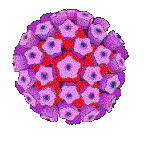 Introduction Introduction Update 2000 Update 2000 Virus Profiles Virus Profiles NLV NLV Norwalk Norwalk SLV SLV Sapporo Sapporo Pathogen Cards Pathogen Cards St. Louis Encephalitis St. Louis Encephalitis HPV2 HPV2 Had5 Had5 Kuru Kuru HTLV-1 HTLV-1 Guanarito Guanarito Drug Profile Drug Profile Amantidine Amantidine AZdU (CS-87) AZdU (CS-87) References References Web Links Web LinksElizabeth Salas & Melissa Valadez Humans and Viruses Human Biology 115A Winter, 2000 Robert Siegel, Instructor Date completed: 3/6/00 |
. |
Helical, dsDNA, monopartite, non-enveloped, 55nm Power (virulence) HPV2 usually associated with common wart Some viruses are characterized by oncogenesis or host cell transformation In general, resistant to inactivation by heat or formalin Offenses Attacks (Mode of replication, transmission) Transmitted through direct contact - virus penetrates the skin through abrasion Replication and assembly occurs in nucleus Genome does not encode a viral polymerase, Replicates using the host polymerase. Important structural proteins include VP1, VP2, and VP3 These structural proteins assemble around the viral minichromosomes and are involved in the formation of viral progeny. Virons released through cell destruction Narrow host range and tissue tropism Outcome (Syndrome, Symptoms) HPV2 associated with the common skin wart Common skin warts are raised papillomas with a rough surface, usually found in areas subject to abrasions, such as knees and hands. HPV 2 is also known to cause common, oral and genital lesions and can cause autoinoculation genital or oral warts from hand lesions Speed (Incubation Period, Replication Speed) Incubation period of up to 2 years Warts tend to disappear within a couple of years - generally ascribed to the T-Cell mediated immune response Defenses Vaccines Experimental vaccines are undergoing clinical trials for certain papovaviridae viruses. Behavioral (Prevention) Usually spread among school-age children via direct contact through abrasions therefore personal hygiene, including hand washing, can be adequate measure in prevention. Treatment Allowing nature to take its course. For faster treatment, skin warts can be removed by cryotherapy or caustic chemicals. Topical medical therapy usually includes once or twice daily application of cytotoxic or antiviral agents usually lasting from 4-6 weeks or longer Game action Your child develops a case of skin warts on her knee. Visit doctor to ask about removal of skin wart. To make your child feel better buy her a toy and roll again. |
. |
